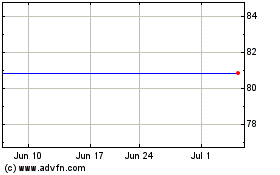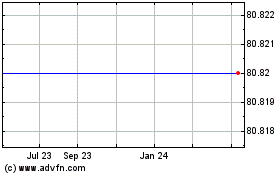Boston Scientific Faces Sales Hit, But Image Another Issue
March 15 2010 - 5:55PM
Dow Jones News
Physicians at a major heart conference were surprised Monday by
news Boston Scientific Corp. (BSX) suspended implantable
defibrillators shipments because of paperwork problems, another hit
to the company's already fragile reputation.
The news will likely hurt Boston Scientific's sales, but
patients shouldn't feel any impact, as long as this remains a
clerical problem, doctors said.
Boston Scientific said Monday that it failed to submit some
manufacturing process changes for Food and Drug Administration
approval. The company declined to describe the process changes that
sparked its dramatic move, other than to say they are
well-established and validated.
"It strikes me as a very huge response to a minor book-keeping
problem," said Douglas Zipes, an electrophysiologist at Indiana
University Medical Center, who doesn't have ties to Boston
Scientific. These doctors implant devices like defibrillators,
which help guard against potentially deadly rhythm problems.
There is little question the recall will hurt business, as
evidenced by Boston Scientific's 12.6% stock slide to $6.80, the
lowest close in about a year, but doctors at the American College
of Cardiology conference didn't see an immediate effect on
patients. It isn't hard to substitute other products, in this cases
defibrillators from Medtronic Inc. (MDT) and St. Jude Medical Inc.
(STJ), they said.
Also, Boston Scientific pegged the matter to a clerical problem,
not a clinical one.
"I don't think our patients are going to suffer because we've
got alternatives," Zipes said.
Nonetheless, the issue is disruptive, because many hospitals are
tied to certain device companies through contracts, said Ralph
Brindis, a general cardiologist at Oakland Medical Center and
president-elect of ACC. Then again, "you can imagine other
companies would want to fill the void," Brindis said.
Many hospitals also contract with multiple companies in an
industry with a history of product problems and supply disruptions.
Those include major product troubles at Guidant Corp. in 2005,
before Boston Scientific bought the company, and Medtronic's recall
in 2007 of faulty cables that connect defibrillators to the
heart.
Shares of Boston Scientific rivals jumped on expectations for
business gains. St. Jude, which depends the most on defibrillator
sales, traded up 8.2% to $40.56, while Medtronic, the heavyweight
in the roughly $6 billion defibrillator market, gained 4.3% to
close at $45.81.
Citigroup analyst Matt Dodds said a five percentage-point market
share loss for Boston Scientific seems possible, and that market
growth in general could slow. "We can't remember the last time
there has been a recall so wide in scope," Dodds said.
The move comes four years after Boston Scientific bought into
the defibrillator business by acquiring the damaged Guidant
franchise. The Natick, Mass., company has worked ever since to
restore a business marred by product recalls and allegations
Guidant was slow to disclose problems--and doctors give Boston
Scientific credit on that front--but the stoppage represents a big
setback.
"I really had hoped they were back," said George Crossley, an
electrophysiologist with a hospital system in Tennessee who also
doesn't have company ties. "They've put in an enormous amount of
effort into really recreating the quality there."
Boston Scientific is scheduled to go before an FDA panel on
Thursday to review the company's bid to expand usage of expensive
heart-failure defibrillators. This is based on a recently
successful major study Boston Scientific funded.
Arthur Moss, a cardiologist at the University of Rochester who
headed that study, and will take part in Thursday's presentation,
said the sales stoppage news "came as a total surprise."
Boston Scientific resolved three years ago an FDA "warning
letter" it inherited with Guidant. That allowed the company to once
again get new products on the market, including two defibrillators
with very thin cases that have helped it regain some footing.
The company recently redesigned the plastic caps on those
devices amid isolated signs they can weaken when placed under chest
muscles, which is rare in the U.S., rather than just under the
skin. An article published in a medical journal recently cited one
case of a problem with an under-the-skin implant, but Boston
Scientific has strongly refuted there was an issue specific to its
device.
The stoppage to defibrillator shipments affects a wider range of
products, however.
-By Jon Kamp, Dow Jones Newswires; 617-654-6728;
jon.kamp@dowjones.com
SJM (NYSE:STJ)
Historical Stock Chart
From Jun 2024 to Jul 2024

SJM (NYSE:STJ)
Historical Stock Chart
From Jul 2023 to Jul 2024
